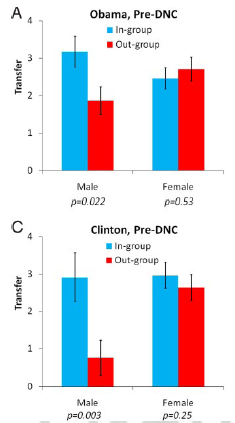Maybe there weren't that many "P.U.M.A.s" after all.
A new Harvard study reports that male voters displayed "in-group" bias for people who shared their candidate preference in the 2008 Democratic presidential primary, while women voters did not.
The tendency to favor fellow Obama or Clinton supporters was measured through a generosity exercise, the "dictator game," which found that male voters chose to be more generous to others who supported their preferred candidate, be it Clinton or Obama. Women voters did not exhibit that tendency. "In-group favoritism existed in male Democrats after Clinton's concession in June," reports the study, and "persisted into August."
What about all those unity gestures during the Democratic Convention?
Researchers say that they worked -- male in-group bias plummeted after the convention. "The public performance of reconciliation seemed to have an immediate effect," said Yochai Benkler, a Harvard professor known for research into technology's effect on politics and media.  Benkler added that the demonstrations of unity appeared to have a larger impact than the cessation of the primary, or the awareness that Democrats faced a "common adversary" in the general election against John McCain.
Benkler added that the demonstrations of unity appeared to have a larger impact than the cessation of the primary, or the awareness that Democrats faced a "common adversary" in the general election against John McCain.
The research was conducted among 395 Democratic voters in Cambridge, MA, so researchers cautioned that the findings may not represent voters around the country, nor impact how people vote. "It is not clear that this lack of in-group bias translated into voting patterns in the 2008 general election," the study noted, "or that our observations were representative of Democrats outside of Cambridge, MA."
The study, officially titled "Dynamic remodeling of in-group bias during the 2008 presidential election," will appear in a forthcoming issue of the Proceedings of the National Academy of Science Early Edition. I received an embargoed copy from Harvard's Berkman Center, which runs an interdisciplinary research group on cooperation, and this is the first publication to emerge from that group.
--
Ari Melber writes for The Nation.